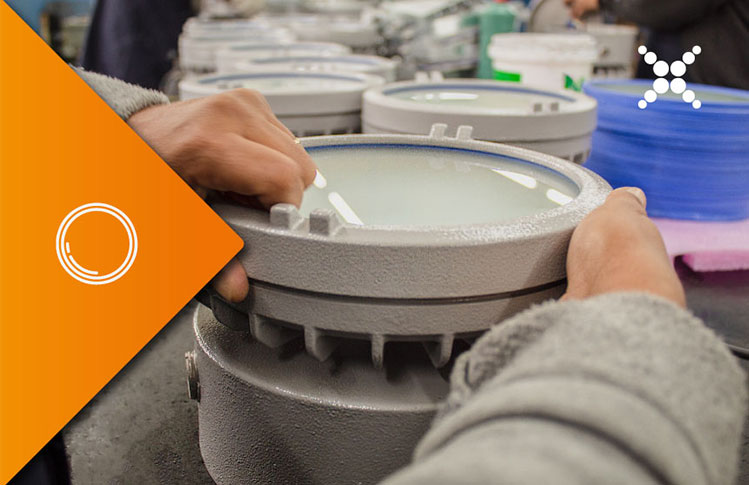Condições Imperdíveis da Black November Aqui! 🔥

Well, when choosing the ideal luminaire for the application, you can come across luminaires with these two characteristics, but what would be the best option anyway?
It depends on the application.
We brought this article to direct the user to the most appropriate choice for your needs without raising false flags, but to bring relevant information about lighting in order to make the user as satisfied as possible with your project!
Let’s go?
The choice between glass or polycarbonate diffuser for an industrial luminaire depends on many factors, such as the environment in which it will be installed, the type of lighting desired and the luminaire’s working conditions.
The first point that we must emphasize is that the polycarbonate diffusers used in industrial lighting need protection against UV rays, which are required in laboratory tests for certification in accordance with INMETRO ordinances.
However, polycarbonate can also be affected by environmental factors, such as heat, humidity and pollutants, which can accelerate the yellowing process, compromising its transparency and original color, consequently compromising its luminous flux.
That is, the exposure of polycarbonate in industrial applications, where the environment is considered severe, containing high levels of pollutants, gases and high temperatures, oxidation of polycarbonate is observed, turning the material yellow.
Finally, in order to guarantee the useful life informed by the manufacturer of the luminaire, it is important to pay attention to the applications, that is, the environment where the luminaire will be installed. Not exposing the material to severe industrial conditions.
The luminaire with polycarbonate cover brings the idea of a lighter and more compact product, therefore it applies to less aggressive environments in the industry.
Glass is a material with many advantages for industrial lighting applications, especially in places where conditions are severe. Some of the advantages of glass include:
What is also relevant to point out that the type of glass used in industrial lighting fixtures is special, meeting the standards, tests and trials required by Inmetro, sometimes more resistant than common glass. What certifies the lifespan of the luminaire announced by the manufacturer.
Finally, we emphasize that the best alternative is the one that best fits your needs and delivers the best result, efficiency and durability.
And, speaking of industrial lighting designed for more aggressive areas, with high levels of dust, vapors and gases, we cannot fail to mention the CLT – Timbó line by Conexled.
CNPJ 54.601.612/0001-69
Conex Eletromecânica Ind e Com Ltda.
A Conexled procura constantemente novos fornecedores para seus negócios.
Se você tem interesse em ser um de nossos parceiros, preencha o formulário abaixo.
Quer ser um representante da Conexled?
Se você tem interesse em ser um parceiro da marca, preencha o formulário abaixo.
Ficou com alguma dúvida, ou precisa de ajuda para escolher a melhor solução para seu projeto?
Fale diretamente com um de nossos consultores.